高中十种时态及被动语态
高中英语知识点归纳被动语态的构成和用法

高中英语知识点归纳被动语态的构成和用法被动语态是英语语法中常用的一个句子结构,被动语态的构成和用法对于学习英语的学生来说非常重要。
本文将就高中英语知识点归纳被动语态的构成和用法进行详细解析,帮助学生更好地掌握这个语法结构。
一、被动语态的构成被动语态的构成由两部分组成:be动词的各种时态形式和过去分词。
根据主句的时态和语态,be动词的形式会相应发生变化。
1. 现在时态的被动语态构成方式:主动语态:主语 + 动词(to be) + 过去分词被动语态:主语 + am/is/are + 过去分词2. 过去时态的被动语态构成方式:主动语态:主语 + 动词(to be) + 过去分词被动语态:主语 + was/were + 过去分词3. 将来时态的被动语态构成方式:主动语态:主语 + 动词(to be) + going to + 过去分词被动语态:主语 + will be + 过去分词4. 现在完成时态的被动语态构成方式:主动语态:主语 + have/has + 过去分词被动语态:主语 + have/has been + 过去分词二、被动语态的用法被动语态主要用来强调动作的承受者,或表达客观事实,又或者在不知道或想隐瞒动作执行者时使用。
下面将介绍被动语态的常见用法:1. 及物动词的被动语态:及物动词是指需要宾语才能完整表达意思的动词,常见的及物动词有:write, read, eat, drink等。
在被动语态中,及物动词的宾语变成主语,而原来的主语则成为介词"by"引导的短语。
例句:Active: John wrote a letter.(约翰写了一封信。
)Passive: A letter was written by John.(一封信被约翰写了。
)2. 不及物动词的被动语态:不及物动词是指没有宾语的动词,如:arrive, come, go等。
这类动词在被动语态中的主语仍然是动作的承受者,同样需要使用be动词的相应时态形式和过去分词构成。
高中英语被动语态讲解及练习(含答案)
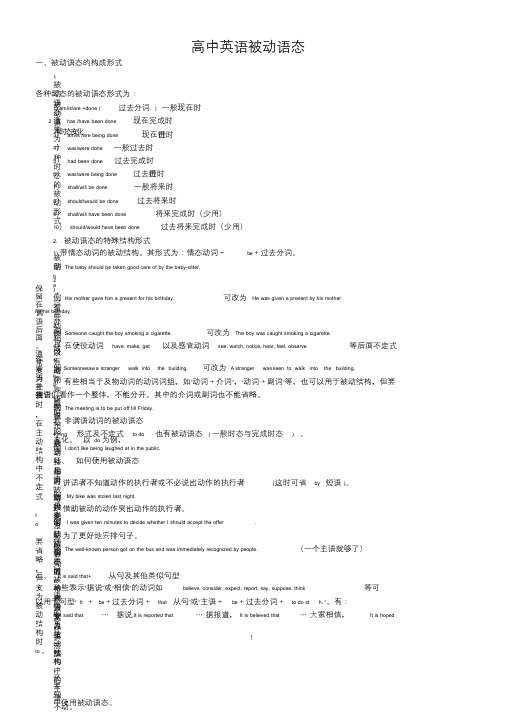
例The glass is broken.(系表结构)
The glass was broken by the boy.(被动语态)
2.如果句中有地点、频率或时间状语时,一般为被动语态。
7.“outof+名词”结构;表示“超出⋯⋯之外“,常见的有:out of control (控制不了),out of sight(超
出视线之外),out of one’s reach够(不着), out of fashion(不流行)等。
例The plane was out of control (can’t be controlled.)。
据建议。
例It is said that the boy has passed the national exam.(=The boy is said to have passed the
national exam.)
四、谓语动词的主动形式表示被动意义
1.英语中有很多动词如break,catch,clean,drive,lock,open,sell,read,write,wash等,当它
10)should/would have been done过去将来完成时(少用)
2.被动语态的特殊结构形式
1)带情态动词的被动结构。其形式为:情态动词+be+过去分词。
例The baby should be taken good care of by the baby-sitter.
2)有些动词可以有两个宾语,在用于被动结构时,可以把主动结构中的一个宾语变为主语,另一宾语仍然
6.在therebe⋯句型中,当动词不定式修饰名词作定语时,不定式用主动式作定语,重点在人,用被动形
八大时态的被动语态结构

八大时态的被动语态结构
以下是八大时态的被动语态结构:
1. 现在时被动语态(Present Simple Passive):主语 + am/is/are + 过去分词。
2. 过去时被动语态(Past Simple Passive):主语 + was/were + 过去分词。
3. 将来时被动语态(Future Simple Passive):主语+ will be + 过去分词。
4. 现在进行时被动语态(Present Continuous Passive):主语 + am/is/are being + 过去分词。
5. 过去进行时被动语态(Past Continuous Passive):
主语 + was/were being + 过去分词。
6. 现在完成时被动语态(Present Perfect Passive):
主语 + has/have been + 过去分词。
7. 过去完成时被动语态(Past Perfect Passive):主语 + had been + 过去分词。
8. 将来完成时被动语态(Future Perfect Passive):主语 + will have been + 过去分词。
高中英语被动语态总结
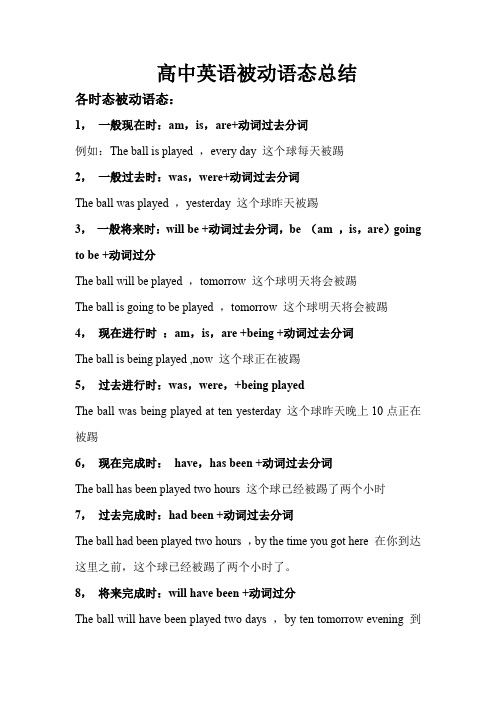
高中英语被动语态总结各时态被动语态:1,一般现在时:am,is,are+动词过去分词例如:The ball is played ,every day 这个球每天被踢2,一般过去时:was,were+动词过去分词The ball was played ,yesterday 这个球昨天被踢3,一般将来时:will be +动词过去分词,be (am ,is,are)going to be +动词过分The ball will be played ,tomorrow 这个球明天将会被踢The ball is going to be played ,tomorrow 这个球明天将会被踢4,现在进行时:am,is,are +being +动词过去分词The ball is being played ,now 这个球正在被踢5,过去进行时:was,were,+being playedThe ball was being played at ten yesterday 这个球昨天晚上10点正在被踢6,现在完成时:have,has been +动词过去分词The ball has been played two hours 这个球已经被踢了两个小时7,过去完成时:had been +动词过去分词The ball had been played two hours ,by the time you got here 在你到达这里之前,这个球已经被踢了两个小时了。
8,将来完成时:will have been +动词过分The ball will have been played two days ,by ten tomorrow evening 到明天晚上10点之前,这个球已经被踢了两个小时了。
注意:1.不及物动词及不及物的动词短语不能用于被动语态。
2.某些感官动词或系动词可加形容词表示被动意义,如:look,taste,smell,feel等。
高中英语知识点归纳动词的被动语态
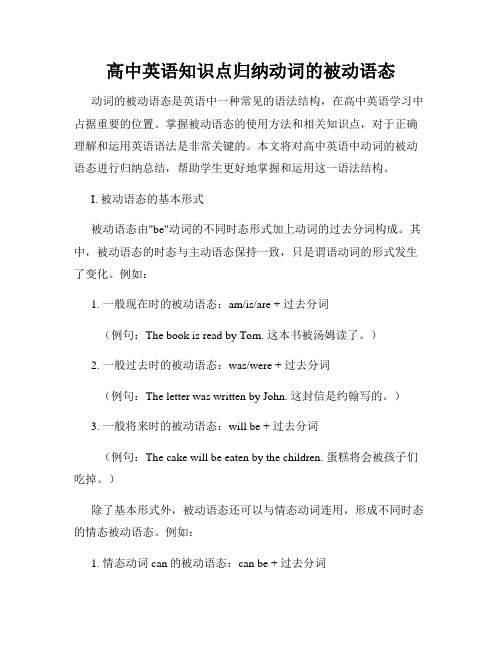
高中英语知识点归纳动词的被动语态动词的被动语态是英语中一种常见的语法结构,在高中英语学习中占据重要的位置。
掌握被动语态的使用方法和相关知识点,对于正确理解和运用英语语法是非常关键的。
本文将对高中英语中动词的被动语态进行归纳总结,帮助学生更好地掌握和运用这一语法结构。
I. 被动语态的基本形式被动语态由"be"动词的不同时态形式加上动词的过去分词构成。
其中,被动语态的时态与主动语态保持一致,只是谓语动词的形式发生了变化。
例如:1. 一般现在时的被动语态:am/is/are + 过去分词(例句:The book is read by Tom. 这本书被汤姆读了。
)2. 一般过去时的被动语态:was/were + 过去分词(例句:The letter was written by John. 这封信是约翰写的。
)3. 一般将来时的被动语态:will be + 过去分词(例句:The cake will be eaten by the children. 蛋糕将会被孩子们吃掉。
)除了基本形式外,被动语态还可以与情态动词连用,形成不同时态的情态被动语态。
例如:1. 情态动词can的被动语态:can be + 过去分词(例句:The problem can be solved by the teacher. 这个问题可以被老师解决。
)2. 情态动词should的被动语态:should be + 过去分词(例句:The car should be repaired by a professional mechanic. 这辆车应该由专业的机械师修理。
)II. 被动语态的用法1. 当我们不知道或不关心动作的执行者时,可以使用被动语态。
例如:(例句:The vase was broken. 这个花瓶被打破了。
)2. 当动作的承受者比执行者更重要或更值得强调时,可以使用被动语态。
例如:(例句:The cake was made by my grandmother.这个蛋糕是我奶奶做的。
被动语态的10种时态形式

被动语态的10种时态形式一、一般现在时的被动语态:被动语态的一般现在时表示主语在现在时被动地接受动作或承受行为。
构成为:be + done。
例如:1. The book is read by me.(这本书被我阅读。
)2. The door is locked by him.(门被他锁上了。
)二、一般过去时的被动语态:被动语态的一般过去时表示主语在过去时被动地接受动作或承受行为。
构成为:was/were + done。
例如:1. The cake was eaten by them.(蛋糕被他们吃掉了。
)2. The letter was written by me.(信被我写了。
)三、一般将来时的被动语态:被动语态的一般将来时表示主语在将来时被动地接受动作或承受行为。
构成为:will be + done。
例如:1. The report will be sent by her.(报告将会被她发送。
)2. The package will be delivered tomorrow.(包裹将在明天被送达。
)四、现在进行时的被动语态:被动语态的现在进行时表示主语在现在进行时被动地接受动作或承受行为。
构成为:am/is/are being + done。
例如:1. The car is being washed by the workers.(汽车正在被工人清洗。
)2. The project is being discussed by the team.(项目正在被团队讨论。
)五、过去进行时的被动语态:被动语态的过去进行时表示主语在过去进行时被动地接受动作或承受行为。
构成为:was/were being + done。
例如:1. The house was being renovated last month.(房子上个月正在进行装修。
)2. The document was being translated by the intern.(文件正在被实习生翻译。
(完整版)各种时态的被动语态举例

各种时态的被动语态举例(以动词do为例)1.一般现在时(am/ is/ are +done)English is spoken by lots of people in the world. 世界上的许多人都说英语。
Class meeting is held every Thursday. 每周四都举行班会。
The classroom is cleaned by the students every day. 学生们每天都打扫教室。
2.一般过去时(was/ were +done)The cup was broken by the boy. 杯子被那个男孩打碎了。
He was saved at last. 他最终获救了。
My bike was stolen. 我的自行车被偷了。
3.一般将来时与过去将来时(will/ shall be +done; would/should be +done)A speech will be given this afternoon. 今天下午有一个演讲。
A new road will be built next year. 明年要修一条新马路。
I thought thousands of people would be helped. 我认为将有数千人得到帮助。
4.现在进行时与过去进行时(am/ is/ are being +done; was/ were being +done) The machine was being repaired at this time yesterday. 昨天这时,机器正在被修理。
The problem is being discussed now. 问题正在被讨论。
A bus is being pushed by the passengers. 路人正在推一辆公共汽车。
5.现在完成时(have/ has been + done)Two hundred trees have been planted by now. 到现在为止,已经种了二百棵树了。
高中英语被动语态知识点总结
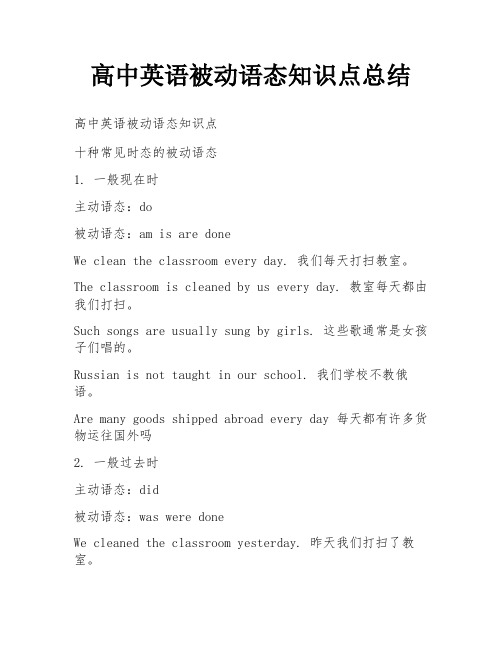
高中英语被动语态知识点总结高中英语被动语态知识点十种常见时态的被动语态1. 一般现在时主动语态:do被动语态:am is are doneWe clean the classroom every day. 我们每天打扫教室。
The classroom is cleaned by us every day. 教室每天都由我们打扫。
Such songs are usually sung by girls. 这些歌通常是女孩子们唱的。
Russian is not taught in our school. 我们学校不教俄语。
Are many goods shipped abroad every day 每天都有许多货物运往国外吗2. 一般过去时主动语态:did被动语态:was were doneWe cleaned the classroom yesterday. 昨天我们打扫了教室。
The classroom was cleaned by us yesterday. 昨天教室被我们打扫了。
The window was broken by my son. 窗子是我儿子打破的。
Were many trees planted on the hill yesterday 昨天山上种了许多树吗?How much money was stolen in all 一共被偷了多少钱?3. 一般将来时主动语态:will shall do被动语态:will shall be doneWe will clean the classroom soon. 我们很快要打扫教室。
The classroom will be cleaned soon. 教室很快要被打扫了。
The work will be done immediately. 这工作将马上做。
Will the school sports meeting be held next week? 校运动会将在下星期举行吗?When shall we be given a lecture on the Internet 什么时候给我们作有关因特网的讲座?4. 一般过去将来时主动语态:would do被动语态:would be doneWe told him that we would clean the classroom soon. 我们告诉他我们马上就打扫教室。
被动语态的句子
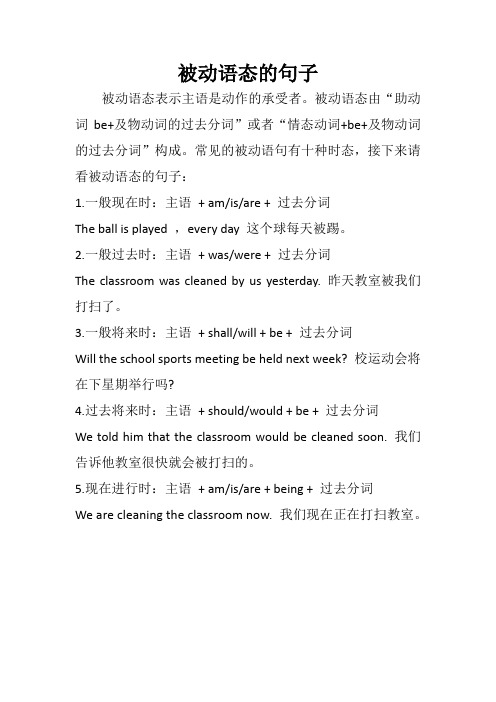
被动语态的句子
被动语态表示主语是动作的承受者。
被动语态由“助动词be+及物动词的过去分词”或者“情态动词+be+及物动词的过去分词”构成。
常见的被动语句有十种时态,接下来请看被动语态的句子:
1.一般现在时:主语+ am/is/are + 过去分词
The ball is played ,every day 这个球每天被踢。
2.一般过去时:主语+ was/were + 过去分词
The classroom was cleaned by us yesterday. 昨天教室被我们打扫了。
3.一般将来时:主语+ shall/will + be + 过去分词
Will the school sports meeting be held next week? 校运动会将在下星期举行吗?
4.过去将来时:主语+ should/would + be + 过去分词
We told him that the classroom would be cleaned soon. 我们告诉他教室很快就会被打扫的。
5.现在进行时:主语+ am/is/are + being + 过去分词
We are cleaning the classroom now. 我们现在正在打扫教室。
高中英语被动语态讲解

高中英语被动语态讲解一、被动语态的构成形式1. 被动语态的基本时态变化被动语态通常为十种时态的被动形式, 被动语态由be+过去分词构成,be随时态的变化而变化。
以do为例,各种时态的被动语态形式为:1) am/is/are +done (过去分词) 一般现在时例:Visitors are requested not to touch the exhibits.2)has /have been done 现在完成时例:All the preparations for the task have been completed, and we're ready to start.3)am/is /are being done 现在进行时例:A new cinema is being built here.4)was/were done 一般过去时例:I was given ten minutes to decide whether I should reject the offer.5)had been done 过去完成时例:By the end of last year, another new gymnasium had been completed in Beijing.6)was/were being done 过去进行时例:A meeting was being held when I was there.7)shall/will be done/ be going to be done/ be about to be done/ be to be to done一般将来时例:Hundreds of jobs will be lost if the factory closes.8)should/would be done; was/ were going to be done; was/ were about to be done; was/ were to be to done一般将来时例:The news would be sent to the soldier's mother as soon as it arrived.9)shall/will have been done 将来完成时(少用)例:The project will have been completed before July.10)should/would have been done 过去将来完成时(少用)例:He told me that his new clothes would have been made very soon. 2. 被动语态的特殊结构形式1)带情态动词的被动结构。
高考英语语法专项:十种常见时态的被动语态
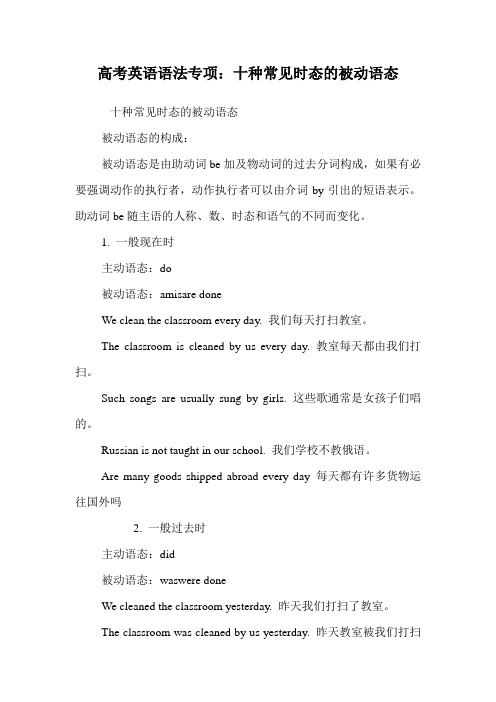
高考英语语法专项:十种常见时态的被动语态十种常见时态的被动语态被动语态的构成:被动语态是由助动词be加及物动词的过去分词构成,如果有必要强调动作的执行者,动作执行者可以由介词by引出的短语表示。
助动词be随主语的人称、数、时态和语气的不同而变化。
1. 一般现在时主动语态:do被动语态:amisare doneWe clean the classroom every day. 我们每天打扫教室。
The classroom is cleaned by us every day. 教室每天都由我们打扫。
Such songs are usually sung by girls. 这些歌通常是女孩子们唱的。
Russian is not taught in our school. 我们学校不教俄语。
Are many goods shipped abroad every day 每天都有许多货物运往国外吗2. 一般过去时主动语态:did被动语态:waswere doneWe cleaned the classroom yesterday. 昨天我们打扫了教室。
The classroom was cleaned by us yesterday. 昨天教室被我们打扫了。
The window was broken by my son. 窗子是我儿子打破的。
Were many trees planted on the hill yesterday 昨天山上种了许多树吗?How much money was stolen in all 一共被偷了多少钱?3. 一般将来时主动语态:willshall do被动语态:willshall be doneWe will clean the classroom soon. 我们很快要打扫教室。
The classroom will be cleaned soon. 教室很快要被打扫了。
高中英语被动语态

2). be going to be done We are going to finish the work on time. The work is going to be done by us on time. 8.含有情态动词的被动语态: can/may/must…be +P.P We must love our hometown. Our hometown must be loved by us. 9.特殊结的被动语态: have/has to be done seem to be done want sth to be done happen to be done ask sth to be done pretend to be done be happy to be done let sth be done
据说她要嫁给一个外国人。
It is rumored that he has been appointed as successo to the president of our company .
据传闻,他已任命为我们公司总裁的接班人了。
It is generally considered impolite to ask one’s age, salary, marriage, etc. 问别距太远而显得句 子松散,因为它的定太长了。)这个提议特别遭到了那些在
本地区投资很大的人的反对。
4.这里我们还要进一步谈谈几种特殊的被动结构。 1)关于带情态动词的被动结构 带情态动词的被动结构的固定句式为“情态动词 + be + 过去分词”。也有个别带“to”的情态动 词例外,如:ought to和have to ,它们的被动结 构就只能在不定式中,即ought/have to be done
英语16种时态与被动语态

英语中的16种时态与被动语态※ 1.一般现在时※基本结构:S + V(原形)被动语态:受动者+ am / is / are + V(过去分词)※ 2.一般过去时※基本结构:S + V(过去式)被动语态:受动者+ was / were + V(过去分词)※ 3.一般将来时※基本结构: S + will / shall / be (am / is / are) going to +V(原形)被动语态:受动者+ will + be + V(过去分词)※ 4.一般过去将来时※基本结构:S + would + V(原形)被动语态:受动者+ would + be + V(过去分词)基本结构:S + am / is / are + V ing被动语态:受动者+ am / is /are + being + V(过去分词)※ 6.过去进行时※基本结构:S + was / were + V ing被动语态:受动者+ was / were + being +V(过去分词)※7.将来进行时※基本结构:S + will + be + V ing被动语态:受动者+ will + being + V(过去分词)※8.过去将来进行时※基本结构:S + would + be + V ing被动语态:受动者+ would + being + V(过去分词)基本结构:S + have / has + V(过去分词)被动语态:受动者+ have / has + been + V(过去分词)※10.过去完成时※基本结构:S + had + V(过去分词)被动语态:受动者+ had + been +V(过去分词)※11.将来完成时※基本结构:S+will+have+V(过去分词)被动语态:受动者+ will + have + been + V(过去分词)※12.过去将来完成时※基本结构:S + would + have + V(过去分词)被动语态:受动者+ would + have + been + V(过去分词)基本结构:S + have / has / + been + V ing被动语态:受动者+ have + has + been + being + V(过去分词)※14.过去完成进行时※基本结构:S + had + been + V ing被动语态:受动者+ had + been + being + V(过去分词)※15.将来完成进行时※基本结构:S + will + have + been + V ing被动语态:受动者+ will + have + been + being + V(过去分词)※16.过去将来完成进行时※基本结构:S + would + have + been + V ing被动语态:受动者+ would+ have+ been +being + V(过去分词)。
高中英语语法

高中英语语法(一)被动语态动词的语态主要分为两种:主动语态与被动语态主动语态指主语是谓语功作的执行者,则为主动关系。
被动语态指主语是谓语动作的承受者,则为被功关系。
I have done the job.(主动句)The job has been done.(被动句)1.被动语态根据时态的不同,可分为以下几种类型:一般现在时:am/is/are+done;一般过去时:was/were+done现在进行时:am/is/are+being done过去进行时:was/were+being done将来时:will/would+be done,be going to be done, be to be done现在完成时:have/has +been done过去完成时:had+been done将来完成时:will+have been done2被动语态门主功语态一样具有不同时态,其时态的变化取决于时间状语,其时态的变化形式由其助动词be的事态变化形式来体现The house is being painted now.(现在进行时被动语态)Eru0ugh has been said to him about it.(现在完成时被动语态)The furniture was bought last week..(过去时被动语态)Youll be punished one day.(将来时被动语态)3.被动语态的意义(1)不知道或没必要指出行为、动作的执行者(无须加buy 短语)Colour TV sets are sold in that shop.Football is plated all over the world.(2)突出和强调行为或动作的承受着。
History is made by the people.The wounded soldiers have been saved by those people.(3)有时主语较长,可后置。
高中英语中的16种时态详细讲解
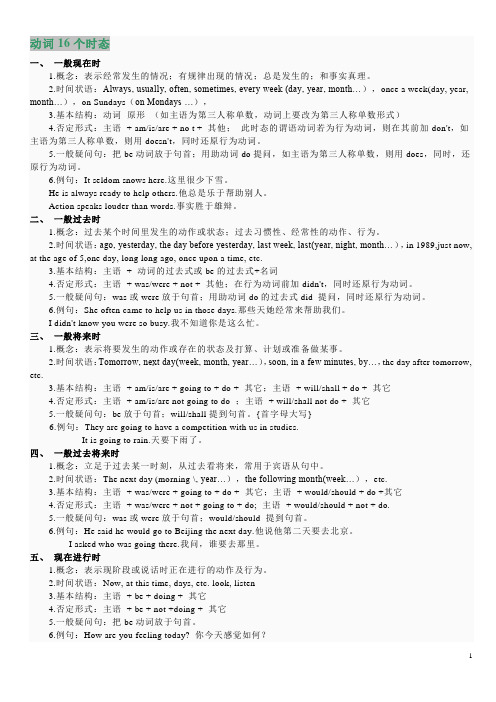
动词16个时态一、一般现在时1.概念:表示经常发生的情况;有规律出现的情况;总是发生的;和事实真理。
2.时间状语:Always, usually, often, sometimes, every week (day, year, month…),once a week(day, year, month…),on Sundays(on Mondays …),3.基本结构:动词原形(如主语为第三人称单数,动词上要改为第三人称单数形式)4.否定形式:主语+ am/is/are + no t + 其他;此时态的谓语动词若为行为动词,则在其前加don't,如主语为第三人称单数,则用doesn't,同时还原行为动词。
5.一般疑问句:把be动词放于句首;用助动词do提问,如主语为第三人称单数,则用does,同时,还原行为动词。
6.例句:It seldom snows here.这里很少下雪。
He is always ready to help others.他总是乐于帮助别人。
Action speaks louder than words.事实胜于雄辩。
二、一般过去时1.概念:过去某个时间里发生的动作或状态;过去习惯性、经常性的动作、行为。
2.时间状语:ago, yesterday, the day before yesterday, last week, last(year, night, month…),in 1989,just now, at the age of 5,one day, long long ago, once upon a time, etc.3.基本结构:主语+ 动词的过去式或be的过去式+名词4.否定形式:主语+ was/were + not + 其他;在行为动词前加didn't,同时还原行为动词。
5.一般疑问句:was或were放于句首;用助动词do的过去式did 提问,同时还原行为动词。
高中基础不同时态下的被动语态 (共12张PPT)

_________ for a long time. • 16.Did he break the window yesterday? • ________ the window _________ __________
__________ yesterday? • 17.They have sold out the light green dresses. • The light green dresses __________ __________
情态动词+ be done
exercise
• 将下列句子变为被动语态,每空一词: • 1. We can finish the work in two days. • The work ________ _________ _________ in
two days. • 2. They produce silk in Suzhou. • Silk _________ _________ in Suzhou. • 3. The children will sing an English song. • An English song ________ _________ ________
各种时态下的被动语态
——Lin
be done
01.一般现在时
高中十种时态及被动语态

精心整理高二暑期课程一高考十种英语时态及被动语态知识梳理十种时态一.一般现在时1)经常性或习惯性的动作,常与表示频度的时间状语连用。
时间状语:every…,sometimes,at…,onSunday等。
Ileavehomeforschoolat7everymorning.2)客观真理,客观存在,科学事实。
Theearthmovesaroundthesun.3)表示格言或警句中。
Pridegoesbeforeafall.Columbusprovedthattheearthisround.4)现在时刻的状态、能力、性格、个性。
AnnWangwritesgoodEnglishbutdoesnotspeakwell.5)一般现在时表将来,主要用来表示在时间上已确定或安排好的事情,或用在倒装句中。
Thetrainleavesatsixtomorrowmorning.Herecomesthebus.=Thebusiscoming.WhenBillcomes,askhimtowaitforme.I'llwritetoyouassoonasIarrivethere.二、一般过去时的用法1)在确定的过去时间里所发生的动作或存在的状态。
时间状语有:yesterday,lastweek,anhourago,theotherday,in1982等。
Wheredidyougojustnow?IsawTominthestreetyesterday.2)表示在过去一段时间内,经常性或习惯性的动作。
WhenIwasachild,Ioftenplayedfootballinthestreet.3)用过去时表示现在,表示语气委婉礼貌。
Didyouwanttospeaktomenow?Iwonderedifyoucouldhelpme.Couldyoulendmeyourbike?4)用在虚拟语气中。
IfIwereabird,IwouldflytoBeijing.特殊句式◎Itistimeforsb.todosth“到……时间了;该……了”,Itistimesb.didsth.“时间已迟了;早该……了”,例如:Itistimeforyoutogotobed.你该睡觉了。
高考英语十大时态

整理课件
8
7. 现在完成时: 主动语态:
have / has done
被动语态: have / has been done
整理课件
9
8. 过去完成时: 主动语态:
had done
被动语态: had been done
整理课件
10
9. 现在完成进行时: 主动语态:
整理课件
5
4.现在进行时: 主动语态:
am / is /are doing
被动语态:
am / is / are being done
整理课件
6பைடு நூலகம்
5. 过去进行时: 主动语态:
was / were doing
被动语态:
was / were being done
整理课件
7
6. 将来进行时: 主动语态: shall / will be doing 被动语态:
have / has been doing
被动语态: have / has been being done
整理课件
11
10. 过去将来时: 主动语态:
should / would do 被动语态: should / would be done
整理课件
12
3
3.一般将来时: 主动语态:
1. will / shall do 2. am /is /are going to do 3. am / is /are about to do 4. am / is / are to do 5. am / is / are doing 6. do / does
整理课件
高中英语十一种时态及被动

高中英语十一种时态及被动高中英语通常涵盖了十一种主要时态以及被动语态。
以下是这些时态及被动的简要介绍:1. 一般现在时(Simple Present Tense):用于描述经常性、习惯性或普遍真理。
例如:I play tennis every Sunday.2. 一般过去时(Simple Past Tense):用于描述过去发生的动作或状态。
例如:She danced at the party last night.3. 一般将来时(Simple Future Tense):用于表示将来发生的动作或计划。
例如:We will go to the beach next weekend.4. 现在进行时(Present Continuous Tense):用于描述正在进行的动作。
例如:They are studying for the exam.5. 过去进行时(Past Continuous Tense):用于描述过去某一时刻正在进行的动作。
例如:He was reading a book when I entered the room.6. 将来进行时(Future Continuous Tense):用于描述将来某一时刻正在进行的动作。
例如:At this time tomorrow, they will be having dinner.7. 现在完成时(Present Perfect Tense):用于描述过去发生的动作对现在的影响或与现在有关的经历。
例如:I have visited Paris.8. 过去完成时(Past Perfect Tense):用于描述过去某一时间点之前已经发生的动作。
例如:She had already left when I arrived.9. 将来完成时(Future Perfect Tense):用于描述将来某一时间点之前将会完成的动作。
例如:By next year, he will havegraduated.10. 现在完成进行时(Present Perfect Continuous Tense):用于描述从过去某一时刻开始,一直持续到现在的动作。
- 1、下载文档前请自行甄别文档内容的完整性,平台不提供额外的编辑、内容补充、找答案等附加服务。
- 2、"仅部分预览"的文档,不可在线预览部分如存在完整性等问题,可反馈申请退款(可完整预览的文档不适用该条件!)。
- 3、如文档侵犯您的权益,请联系客服反馈,我们会尽快为您处理(人工客服工作时间:9:00-18:30)。
高二暑期课程一高考十种英语时态及被动语态知识梳理十种时态一.一般现在时1) 经常性或习惯性的动作,常与表示频度的时间状语连用。
时间状语:every…, sometimes, at…, on Sunday等。
I leave home for school at 7 every morning.2) 客观真理,客观存在,科学事实。
The earth moves around the sun.3) 表示格言或警句中。
Pride goes before a fall.Columbus proved that the earth is round.4) 现在时刻的状态、能力、性格、个性。
Ann Wang writes good English but does not speak well.5)一般现在时表将来,主要用来表示在时间上已确定或安排好的事情,或用在倒装句中。
The train leaves at six tomorrow morning.Here comes the bus. = The bus is coming.When Bill comes, ask him to wait for me.I'll write to you as soon as I arrive there.二、一般过去时的用法1)在确定的过去时间里所发生的动作或存在的状态。
时间状语有:yesterday, last week, an hour ago, the other day, in 1982等。
Where did you go just now? I saw Tom in the street yesterday.2)表示在过去一段时间内,经常性或习惯性的动作。
When I was a child, I often played football in the street.3)用过去时表示现在,表示语气委婉礼貌。
Did you want to speak to me now?I wondered if you could help me.Could you lend me your bike?4)用在虚拟语气中。
If I were a bird, I would fly to Beijing.特殊句式◎It is time for sb. to do sth “到……时间了;该……了”,It is time sb. did sth. “时间已迟了;早该……了”,例如:It is time for you to go to bed. 你该睡觉了。
It is time you went to bed.你早该睡觉了。
◎ would (had) rather sb. did sth. 表示“宁愿某人做某事”,例如:I'd rather you came tomorrow.三、一般将来时1) shall用于第一人称,常被will 所代替。
will 在陈述句中用于各人称,在征求意见时常用于第二人称。
Will you be at home at seven this evening?2) be going to +不定式,表示将来计划做某事,或者按照迹象可能发生的事。
What are you going to do tomorrow?Look at the dark clouds; there is going to be a storm.3) be +不定式表将来,按计划或正式安排将发生的事。
We are to discuss the report next Saturday.4) be about to +不定式,意为马上做某事,不与表示明确将来时的时间状语连用。
He is about to leave for Beijing.四、现在进行时1. 表示现在( 指说话人说话时) 正在发生的事情。
例如:We are waiting for you.2. 习惯进行:表示长期的或重复性的动作,说话时动作未必正在进行。
例如:Mr. Green is writing another novel.3. 表示渐变的动词有:get, grow, become, turn, run, go, begin等。
It's getting warmer and warmer.4. 与always, constantly, forever 等词连用,表示反复发生的动作或持续存在的状态,往往带有说话人的主观色彩。
You are always changing your mind.注意:不用进行时的动词1) 事实状态的动词。
如:have, belong, possess, cost, owe, exist, include, contain, matter, weigh, measure, continue2) 心理状态的动词。
如:know, realize, think see, believe, suppose, imagine, agree, recognize, remember, want, need, forget, prefer, mean, understand, love, hate3) 瞬间动词。
如:accept, receive, complete, finish, give, allow, decide, refuse.4) 系动词。
如:seem, remain, lie, see, hear, smell, feel, taste, get, become, turn五、过去进行时1)概念:表示过去某时正在进行的状态或动作。
2)过去进行时的主要用法是描述一件事发生的背景;一个长动作发生的时候,另一个短动作发生。
3) 常用的时间状语有:this morning, the whole morning, all day yesterday, from nine to ten last evening, when, whileIt was raining when they left the station.六现在完成时1)构成:助动词have (has) + 动词的过去分词2) 现在完成时的用法:表示过去发生或已经完成的某一动作对现在造成的影响或结果。
通常与表示包括现在在内的时间副词just,already, before, yet, never, ever 等状语连用。
例如:I have never heard of that before.Have you milked the cow yet? Yes, I have done that already.3) 现在完成时表示过去已经开始,持续到现在,也许还会持续下去的动作或状态。
可以和表示从过去某一时刻延续到现在(包括现在在内)的一段时间的状语连用。
如:for和since,以及so far, now, today, this week(month, year) 等。
② She has learnt English for 3 years.③ They have lived here since 1990.注意:表示短暂时间动作的词,如come, go, die, marry, buy等的完成时不能与for, since等表示一段时间的短语连用。
4)现在完成时还可以用在时间和条件状语从句中,表示将来某时完成的动作,例如:If it has stopped snowing in the morning, we’ll go to the park.注意:1.have been (to)和have gone (to)的区别:have / has been (to) 表示“曾经去过”某地,说话时此人很可能不在那里,已经回来。
侧重指经历。
have / has gone (to) 表示某人“已经去了”某地,说话时此人不在这里。
He has been to Beijing. 他曾去过北京。
He has gone to Beijing. 他已经去了北京。
2.延续动词与瞬间动词1) 用于完成时的区别:延续动词表示经验、经历;瞬间动词表示行为的结果,不能与表示段的时间状语连用。
He has completed the work. 他已完成了那项工作。
(表结果)I've known him since then. 我从那时起就认识他了。
(表经历)2) 用于till / until 从句的差异:延续动词用于肯定句,表示“做……直到……” ;瞬间动词用于否定句,表示“到……,才……”。
He didn't come back until ten o'clock. 他到10 点才回来。
He slept until ten o'clock. 他一直睡到10点。
七、过去完成时的用法1)概念:表示过去的过去。
----------------|-----------------------|-------------------------|---------> t那时以前那时现在其结构是:had + 过去分词2)过去完成时的用法:1.过去完成时表示过去某一时刻或者某一动作之前完成的动作或状态;句中常用by, before, until, when等词引导的时间状语。
2. 过去完成时的动词还可以表示过去某一时刻之前发生的动作或者状态持续到过去某个时间或者持续下去。
3.在told, said, knew, heard, thought等动词后的宾语从句。
4.在过去不同时间发生的两个动作中,发生在先,用过去完成时;发生在后,用一般过去时。
5. 表示意向的动词,如hope, wish, expect, think, intend, mean, suppose等,用过去完成时表示"原本…,未能…"6.过去完成时的时间状语before, by, until , when, after, once, as soon as。
By the end of last year we had built five new houses.Before he slept, he had worked for 12 hours.She said (that) she had never been to Paris.When the police arrived, the thieves had run away.We had hoped that you would come, but you didn't.八、过去将来时1)基本概念:过去将来时表示从过去的某一时间看将要发生的动作或存在的状态。
